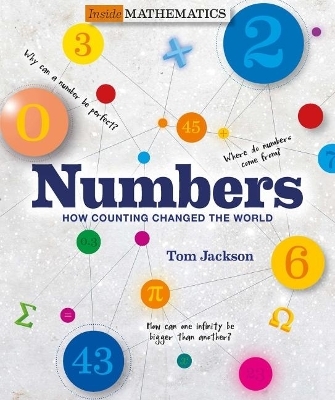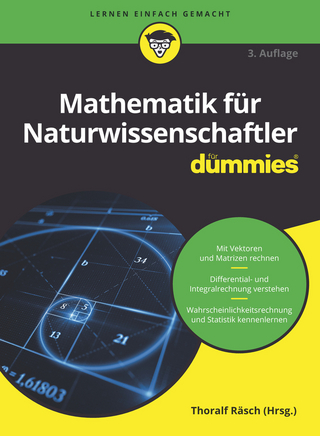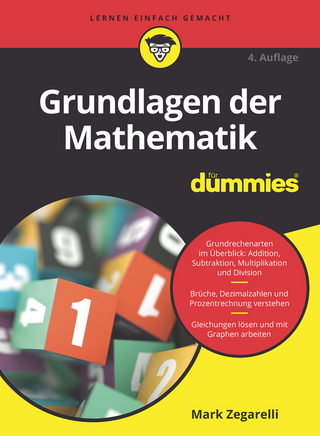
Numbers
How Counting Changed the World
Seiten
2018
Shelter Harbor Press (Verlag)
978-1-62795-074-9 (ISBN)
Shelter Harbor Press (Verlag)
978-1-62795-074-9 (ISBN)
- Titel z.Zt. nicht lieferbar
- Versandkostenfrei innerhalb Deutschlands
- Auch auf Rechnung
- Verfügbarkeit in der Filiale vor Ort prüfen
- Artikel merken
The first book in a new series One of the hardest questions that mathematics teachers have to answer is "Why?" Schoolroom sums are crucial in learning the awesome power of mathematics, but they are often a world away from how the knowledge is applied and where it came from. Numbers: How Counting Changed the World is there to fill that gap.
The first book in a new series
One of the hardest questions that mathematics teachers have to answer is "Why?" Schoolroom sums are crucial in learning the awesome power of mathematics, but they are often a world away from how the knowledge is applied and where it came from. Numbers: How Counting Changed the World is there to fill that gap.
The story of numbers begins with counting 1,2, 3... but it ends with a mind-boggling mass of numbers so densely packed that we can't be sure where one number ends and another begins. Along the way we meet superhero numbers like , e and googol; we learn that numbers can be perfect, irrational, even imaginary; and that modern mathematics still bears the hallmarks of many ancient civilizations.
Numbers: How Counting Changed the World introduces the amazing people who figured out what numbers are and what they can do. Written to engage, entertain, and enthuse young people, it shows readers how the ideas of long-dead geniuses ended up in their homework assignments: The Mayans of ancient Mexico were using zeros long before anyone else, and we count time and angles in multiples of 60 because that is what the people of Babylon did (for good reason). Meanwhile Pythagoras was a murderer, the shape of a credit card is defined by the golden ratio, and John Napier, the inventor of logarithms, seldom appeared in public without his pet rooster!
The first book in a new series
One of the hardest questions that mathematics teachers have to answer is "Why?" Schoolroom sums are crucial in learning the awesome power of mathematics, but they are often a world away from how the knowledge is applied and where it came from. Numbers: How Counting Changed the World is there to fill that gap.
The story of numbers begins with counting 1,2, 3... but it ends with a mind-boggling mass of numbers so densely packed that we can't be sure where one number ends and another begins. Along the way we meet superhero numbers like , e and googol; we learn that numbers can be perfect, irrational, even imaginary; and that modern mathematics still bears the hallmarks of many ancient civilizations.
Numbers: How Counting Changed the World introduces the amazing people who figured out what numbers are and what they can do. Written to engage, entertain, and enthuse young people, it shows readers how the ideas of long-dead geniuses ended up in their homework assignments: The Mayans of ancient Mexico were using zeros long before anyone else, and we count time and angles in multiples of 60 because that is what the people of Babylon did (for good reason). Meanwhile Pythagoras was a murderer, the shape of a credit card is defined by the golden ratio, and John Napier, the inventor of logarithms, seldom appeared in public without his pet rooster!
Tom Jackson is a science writer based in the United Kingdom. Tom specializes in recasting science and technology into lively historical narratives. After almost 20 years of writing, Tom has uncovered a wealth of stories that help create new ways to enjoy learning about science. He studied at the University of Bristol and still lives in the city with his wife and three children.
| Erscheinungsdatum | 02.06.2017 |
|---|---|
| Reihe/Serie | Inside Mathematics |
| Verlagsort | New York |
| Sprache | englisch |
| Maße | 191 x 228 mm |
| Gewicht | 658 g |
| Themenwelt | Mathematik / Informatik ► Mathematik ► Allgemeines / Lexika |
| Mathematik / Informatik ► Mathematik ► Geschichte der Mathematik | |
| ISBN-10 | 1-62795-074-5 / 1627950745 |
| ISBN-13 | 978-1-62795-074-9 / 9781627950749 |
| Zustand | Neuware |
| Haben Sie eine Frage zum Produkt? |
Mehr entdecken
aus dem Bereich
aus dem Bereich


